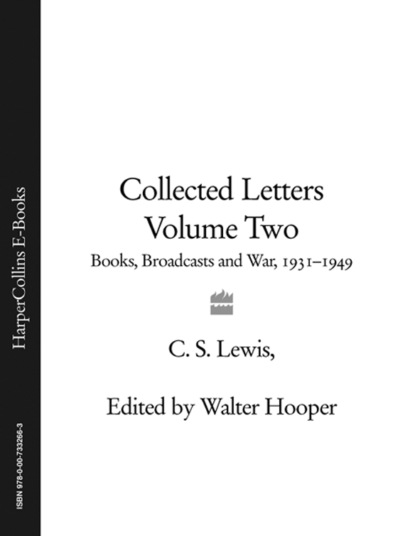По всем вопросам обращайтесь на: info@litportal.ru
(©) 2003-2025.
✖
Collected Letters Volume Two: Books, Broadcasts and War, 1931–1949
Настройки чтения
Размер шрифта
Высота строк
Поля
My dear Barfield
What frightfully bad luck. (This would have been really an ideal week end as, in addition to having papers to correct so that I couldn’t talk, I have run a needle into my foot so that I can’t walk: you could have concentrated on Orpheus with almost no interruption). I hope the measles will soon go over, and it’ll go hard but we’ll fix up another time in the long vac. I’m afraid the lyric is not very appropriate, now!
Think not the doom of man reversed for thee. Apropos of Johnson, isn’t this good, from the Rambler, from a man who decided not to marry a blue-stocking on finding her an atheist and a determinist. ‘It was not difficult to discover the danger of committing myself forever to one who might at any time mistake the dictates of passion, or the calls of appetite, for the decree of fate; or consider cuckoldom as necessary to the general system, as a link in the everlasting chain of successive causes.’
(#ulink_81c6349a-35d4-5b2b-a79c-7609d1805d5b)
And, in another way, isn’t this splendid ‘Whenever, after the shortest relaxation of vigilance, reason and caution return to their charge, they find hope again in possession.’
(#ulink_04f93340-4491-5f4b-ac2d-3d9ea2689899)
What is the betting I forget to put that lyric in after all?—They keep sheep in Magdalen grove now and I hear the fleecy care bleating all day long; I am shocked to find that none of my pupils, though they are all acquainted with pastoral poetry, regards them as anything but a nuisance: and one of my colleagues has been heard to ask why sheep have their wool cut off. (Fact)
It frightens me almost. And so it did the other night when I heard two undergrads. giving a list of pleasures which were (a) Nazi, (b) Leading to homosexuality. They were, feeling the wind in your hair, walking with bare feet in the grass, and bathing in the rain. Think it over: it gets worse the longer you look at it. More cheering is the true report from Cambridge of a conversation
1 What is this Ablaut that K. keeps on talking about in his lectures?
2 Oh don’t you know, he was in love with Eloise.
I must fix my Irish visit before I can make a new date with you, but we’ll manage one before or after your holidays. When are you going away? You note that hope is once again in possession.
Yours
C. S. Lewis
TO OWEN BARFIELD (W):
Sept 6th 1938
My dear B.
(1.) As at present advised I can come on 23rd, but no date is so safe as the 30th. I am sure Cecil said he could not come before the end of Sept. but a I may be wrong and Β the fixture between you and me was prior and he is merely appenditical and agglutinative. All the same I’d much prefer the 30th if you can possibly do it.
(2.)
Some believe the slumber Of trees is in December When timber’s naked under star And the squirrel keeps his chamber.
But I believe their fibre Awakes to life and labour When turbulence comes roaring up The land in loud October,
And charges, and enlarges The beach, and long besieges, And scourges trees till, like the bones Of thought, their shape emerges.
Form is soul. In warmer Seductive days, disarming Its firmer will, the wood grows soft And spreads its dreams to murmur;
Into earnest winter, Like souls awaked, it enters. The hunter frost and the cold light Have quelled the green enchanter.
(#ulink_eb790efc-b056-5b21-9ddb-58c8db039ff3)
(3.) Isn’t Jupiter splendid these nights? C.S.L.
Lewis had already mentioned in his letter to Griffiths of 29 April theimpending danger of war; in the next two he explores his increasing and justified concern. For this was the time of the Munich crisis. In March 1938 Germany had invaded Austria. By the end of May, encouraged by the lack of reaction to the invasion on the part of Britain and France, Hitler began to threaten Czechoslovakia, and especially the Sudetenland-a tiny section of the Czech Republic that lay on the border of Germany.
In June 1938 Neville Chamberlain, the British Prime Minister, said ‘off the record’ that Britain favoured turning over the Sudetenland to Germany ‘in the interest of peace’. He sent a representative to Czechoslovakia to mediate between that country and the Sudeten Germans. Finally, on 5 September, the Czech president agreed to accept the German demands. That was not at all what Hitler wanted, and he used his own propaganda machine to cause outbreaks of fighting in the Sudetenland. This, in turn, led Czechoslovakia to declare martial law.
Britain and its allies were very keen to avoid war, and on 29 September 1938 representatives from Germany, England, France and Italy met in Munich to decide Czechoslovakia’s fate. An agreement was signed stating that Germany would take over the Sudetenland. On 1 October German troops began occupying the region. After that similar settlements were made over Hungary and Poland. Hitler had succeeded and by 15 March 1939 he was to occupy the whole of Czechoslovakia.
TO OWEN BARFIELD (W):
Magdalen College
Oxford
Sept 12th 1938
My dear Barfield
What awful quantities of this sort of thing seem necessary to break us in, or, more correctly, to break us off. One thinks one has made some progress towards detachment, some
,
(#ulink_cb57c1bf-718b-53a6-8f6d-c1f890566326) and begin[s] to realise, and to acquiesce in, the rightly precarious hold we have on all our natural loves, interests, and comforts: then when they are really shaken, at the very first breath of that wind, it turns out to have been all a sham, a field-day, blank cartridges.
This is how I was thinking that night, about the war danger. I had so often told myself that my friends and books and even brains were not given me to keep: that I must teach myself at bottom to care for something else more (and also of course to care for them more but in a different way) and I was horrified to find how cold the idea of really losing them struck. An awful symptom is that part of oneself still regards troubles as ‘interruptions’ as if (ludicrous idea) the happy bustle of ones personal interests was our real
,
(#ulink_9d7dfca0-28dc-57cc-8694-a62ff1df0298) instead of the opposite.
I did in the end see (I dare not say ‘feel’) that since nothing but these forcible shakings will cure us of our worldliness, we have at bottom reason to be thankful for them. We force God to surgical treatment: we won’t (mentally) diet.
This morning comes your letter, and I know you at least (I cd. hardly depend on any one else for so much) will not think me heartless for connecting it in this way with what I was already thinking, for the subjects really flowed together—indeed they are the same subject.
Well, well: you know all I am thinking about at least as well as I do. As you said in that essay of yours one cannot in the Simon of Cyrene moment see the cross from the Joseph of Arimathea point of view, but one can remember that the other side is real: hence that apparently naked will, stripped of its emotional motives, which, on your view, is alone free.
I have a lot more to say on this (I’ve just read the Theologia Germanica)
(#ulink_ba557856-e0e6-5f6e-9599-9f4714a1fb59) when we meet. That is, if we meet, for of course our whole joint world may be blown up before the end of the week. I can’t feel in my bones that it will, but my bones know dam’ all about it. If we are separated, God bless you, and thanks for a hundred good things I owe to you, more than I can count or weigh. In some ways we’ve had a corking time these 20 years.
Be thankful you have nothing to reproach yourself about in your relations with your father (I had lots) and that it is not some disease. The horror of a stroke must be felt almost entirely by the spectators.
(#ulink_dd3aab1f-dba6-536b-8789-f5a5032edacd)
I’ll fix with Cecil.
Yours
C. S. Lewis
Out of the Silent Planet was published by John Lane, the Bodley Head on 23 September 1938.

















